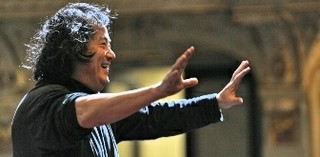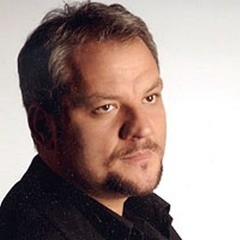|
Back
The Energy of the Survivors New York
Isaac Stern Auditorium, Carnegie Hall
10/09/2014 -
Peter Ilyich Tchaikovsky: Slavonic March, Opus 31
Giuseppe Verdi: Macbeth: "Pietà, rispetto, amore" & Ballet Music – Rigoletto: "Pari siamo"
Jean Sibelius: Symphony No. 2 in D Major, Opus 43
Zeljko Lucic (Baritone)
Belgrade Philharmonic Orchestra, Muhai Tang (Chief Conductor)

M. Tang (© Jef Rabillon)
If the debut of the Belgrade Philharmonic was particularly fiery last night, remember that both orchestra and conductor had survived their own political trials by fire.
The Belgrade Philharmonic, founded 91 years ago in this one-time somnolent capital of the Ottoman Empire, originally had the singular sound of both Serbian and Russian musicians. With the fall of the Berlin War, the Soviet members quickly departed. During the Balkan Wars two decades ago, other players departed, and for all practical purposes, it was dormant.
Yet the orchestra was reborn a decade ago, with marvellous results. Thanks to the help of Zubin Mehta, who inspired other soloists to join the Belgrade Philhrmonic (including Gérard Depardieu conducting a horrible Marche Slave), the orchestra has continued on a relatively firm financial basis–and the players are all young, quick and sometimes dazzling.
Their Music Director Muhai Tang went through his own Purgatory. The scion from a renowned Chinese intellectual family, that very status tore him from his parents to serve in an iron foundry during the Cultural Revolution.
His recovery was equally impressive. Muhai Tang went from the foundry to the Shanghai Conservatory, and his reputation reached the ears of Herbert von Karajan, who invited him (or rather, persuaded the Chinese Government to release him) to Europe. Today, he conducts several major orchestras but spends half his year back in China.
These singular non-musical challenges may have subconsciously inspired the artists, but their performance last night was consciously a musical tribute to their talents.
Not that the 96 players were up to the standards of our NY Phil or this week’s Berlin Phil. The soloists made a few forgivable fluffs. In the third movement of the Sibelius Second, we had some blurry moments. But the energy, the galvanizing force of Muhai Tang and the electric response of the Belgrade Philharmonic was frequently arresting.
After the American and Serbian national anthems (with the diversion of an audience confused whether to rise for the latter), Mr. Tang began with a spine-tingling version of what had originally been labeled Serbo-Russian March. This was of course Marche Slave, using both the Russian anthem and a few Serbian folk songs. It may have been a Tchaikovsky pièce d’occasion, but Mr. Tang turned into a call for war.
In this version–including a wind section that exactly duplicated an accordion–John Philip Sousa would have felt castrated. This was so utterly belligerent that–to rephrase the Thomas Berger line–I really felt like invading Constantinople and pushing the Sultan off the Topkapi battlements.
The final work was Sibelius’ Second Symphony, where again, Mr. Tang showed, unerringly, that he was a devoted student of Herbert von Karajan. Physically, the Maestro has no outwardly showy directions, he is conservative, confident, but does, in the most exciting measures, reach out to emotionally cue in his players.
Musically, Von Karajan would have recognized Mr. Tang’s straightforward, no-nonsense attitude to the Sibelius. Like Von Karajan, Mr. Tang created the illusion that the tempos were faster than they actually were. The opening Allegretto had a volition in the strings that seemed to push it forward even while the tempo was right. The last three movements were played with that same visceral energy.
Those looking for the Sibelius poetry, the austere, even moody appreciation of nature, would find it wanting. Those, like myself, who love the cataclysms and earthquakes as much as the landscapes found it a terrific performance.

Z. Lucic (© Barrett Advantage)
In between these orchestral works (and the ballet music from Macbeth), came the voice–I would call it an Italian helden-baritone voice –of Zeljko Lucic. The Serbian-born singer is familiar in the Metropolitan Opera and opera halls around the world, as one of the most prominent singers. And for good reason. Even in the concert hall, this is a voice which rings to the rafters, which is stentorian, dominating, which almost begs for appreciation.
His aria from Macbeth was commanding, but Pari siamo was a lesson in drama as well as singing, as he acted and sung the hunchback.
An encore was called for. One uncouth member of the audience mused that he sing something from his homeland, like an aria from Mozart’s La Clemenza di Tito or Pergolesi’s La Serbia padrona, but he finished with Verdi, from The Masked Ball.
Like the orchestra, Mr. Lucic showed the energy, a pulsing vitality which penetrated the entire evening.
Alas, visiting orchestras feel it necessary to end with a few encores, and after the Sibelius, this seemed unnecessary. (One should go home with the tinnitus of ringing brass). Still, Mr. Tang kept up the momentum, with two Serbian works, the apparently traditional River Drina March, and the “Turtledove” dance from Stevan Hristić’s ballet The Legend of Ohrid. While unfamiliar to this non-Serbian listener, both seemed to have that same orchestral enthusiasm and exhilaration which penetrated the entire evening.
Harry Rolnick
|